新概念英语二 Lesson15 Good news课件(共52张PPT)
文档属性
| 名称 | 新概念英语二 Lesson15 Good news课件(共52张PPT) | 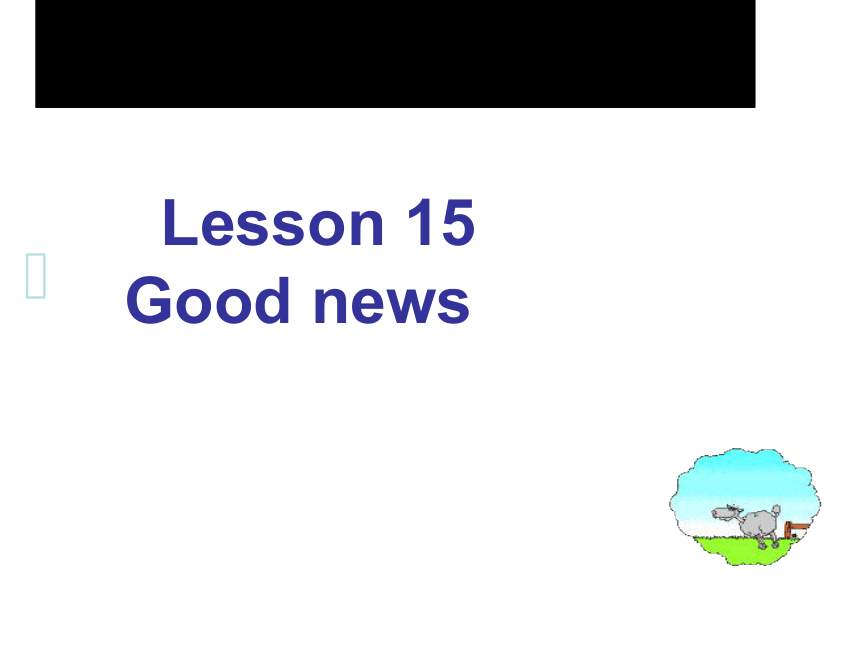 | |
| 格式 | ppt | ||
| 文件大小 | 950.5KB | ||
| 资源类型 | 教案 | ||
| 版本资源 | 新概念英语 | ||
| 科目 | 英语 | ||
| 更新时间 | 2024-04-23 15:08:25 | ||
图片预览

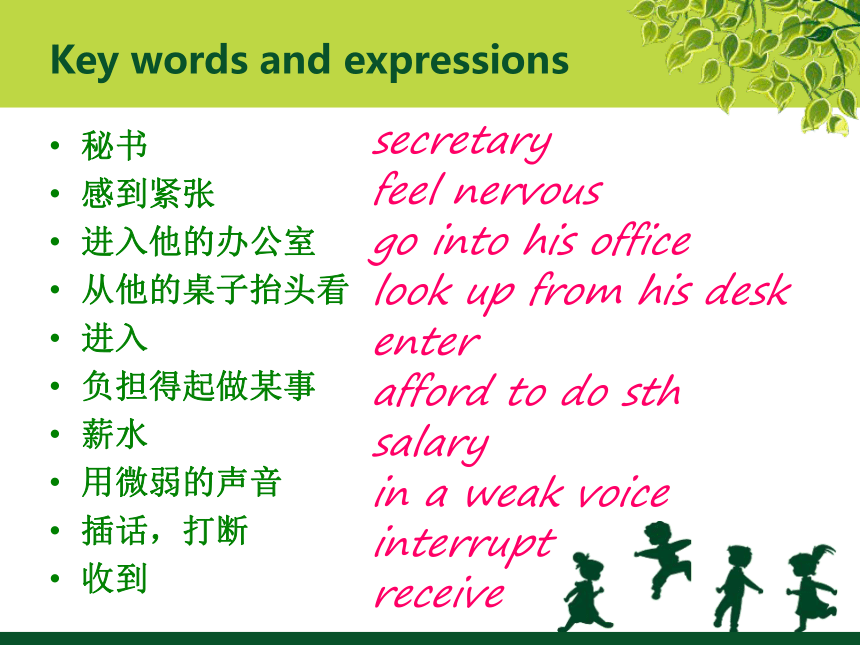
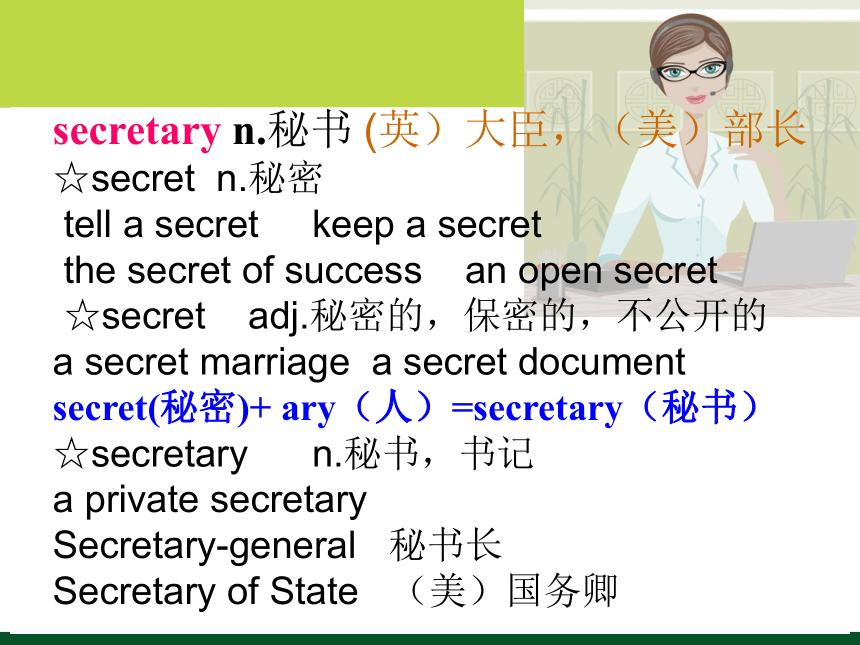
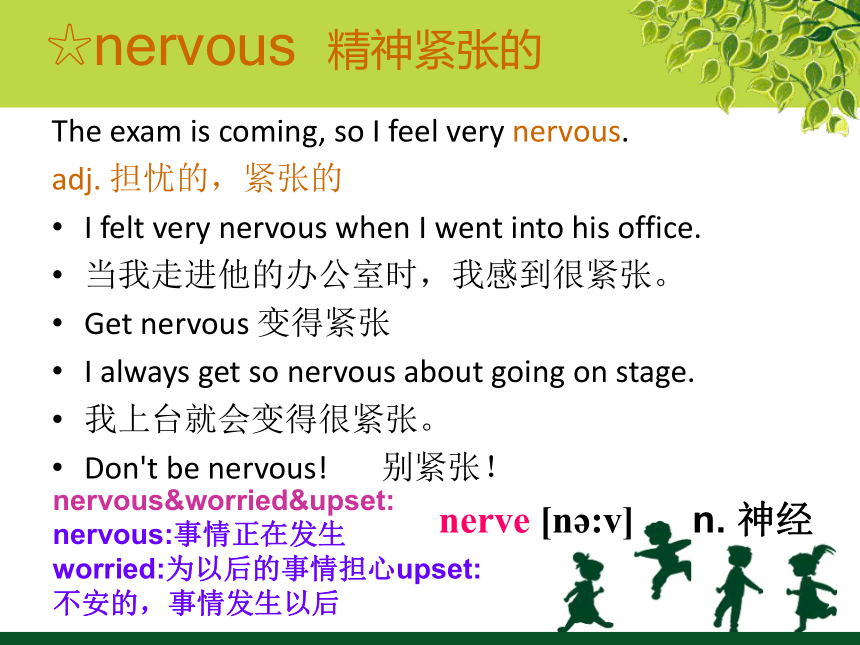
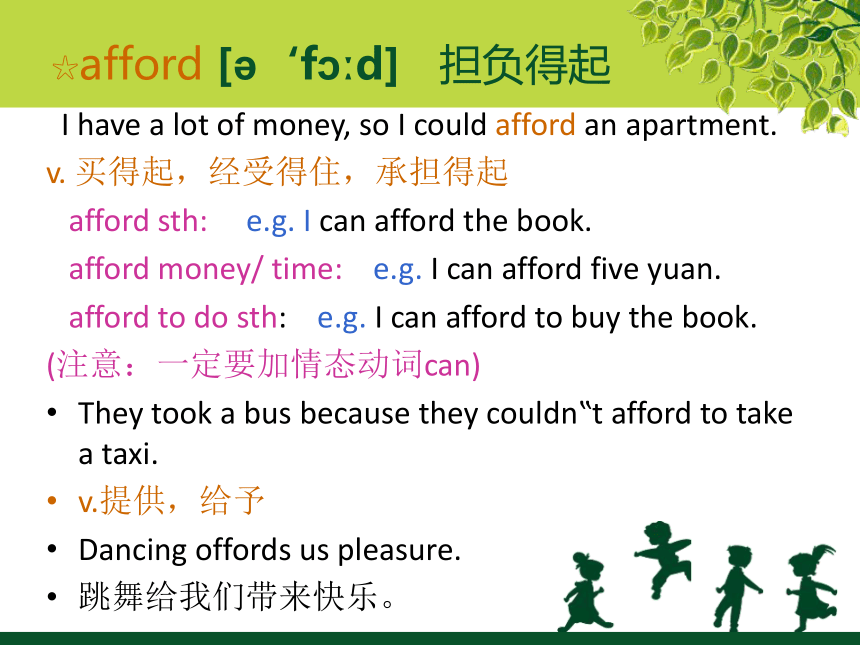

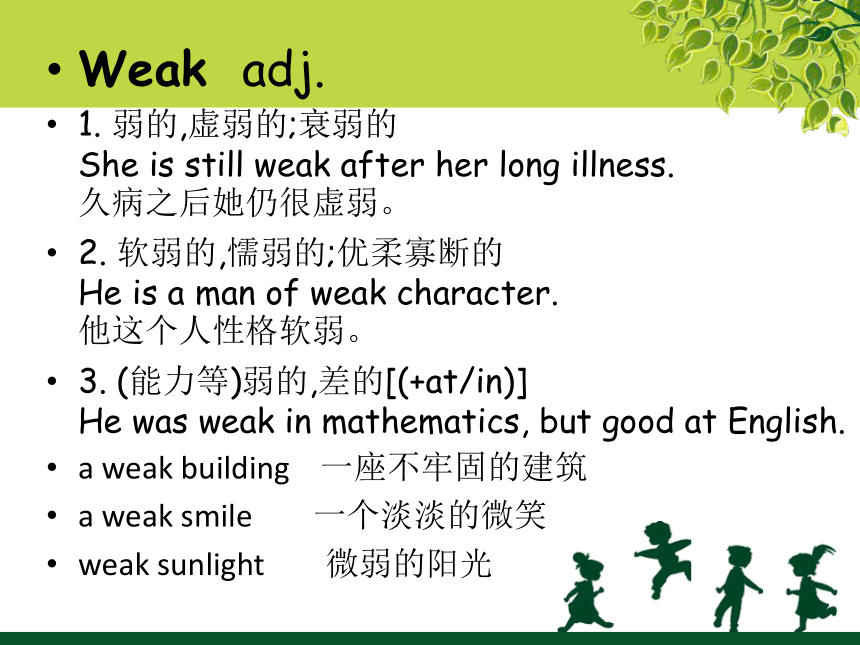
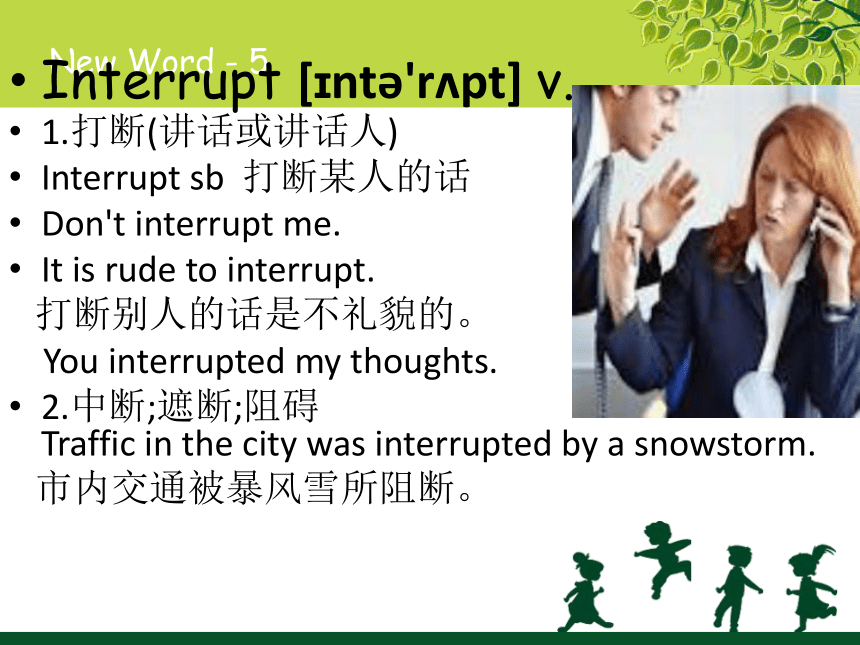
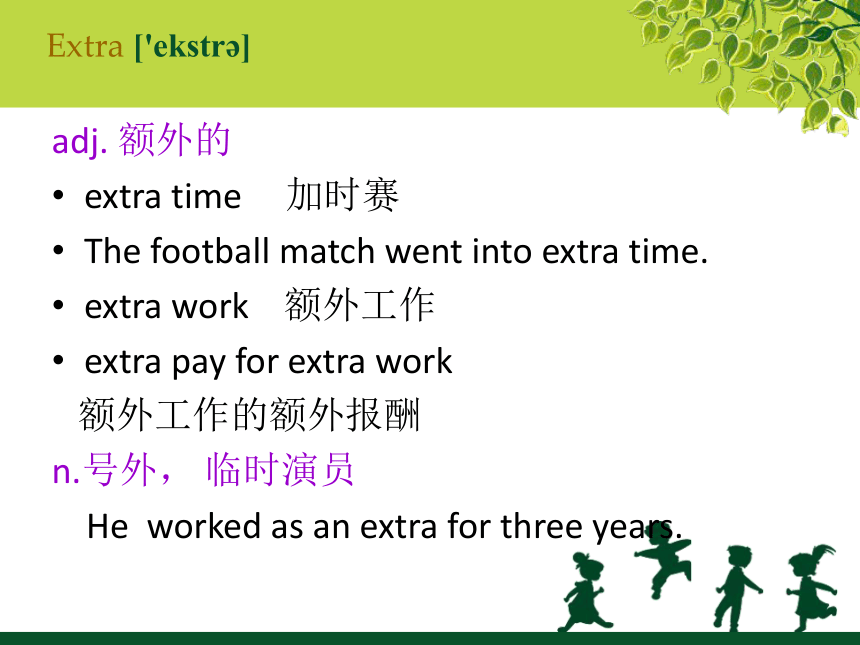
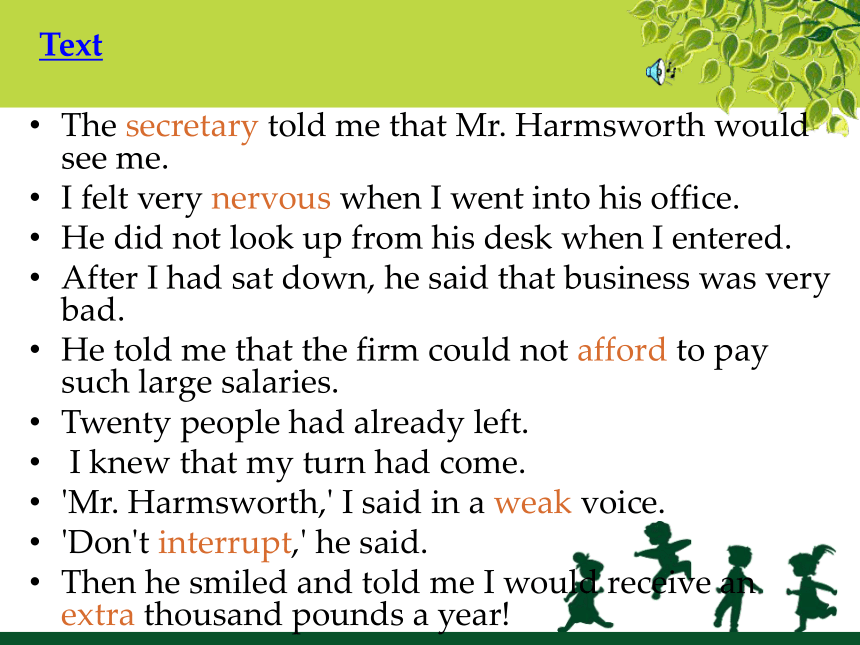
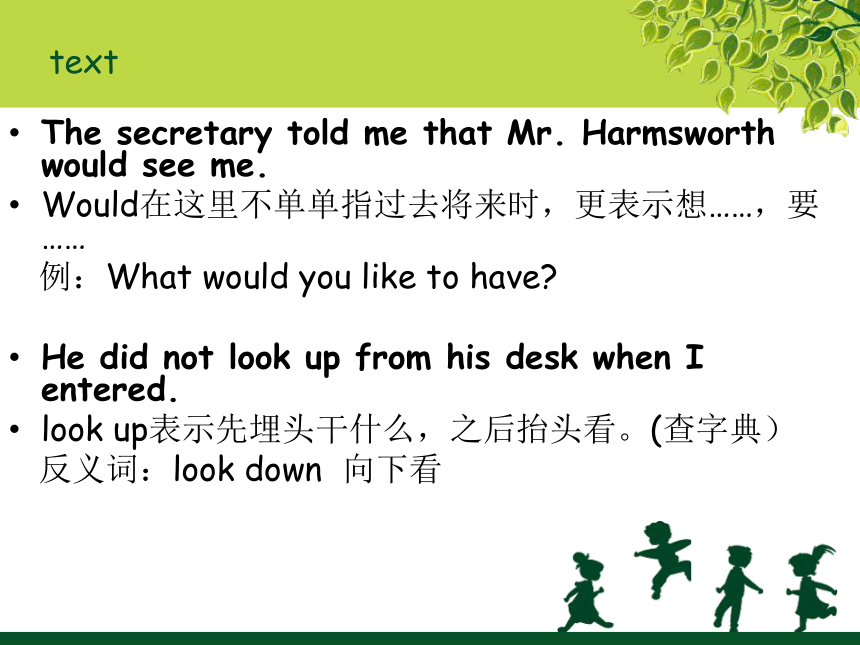
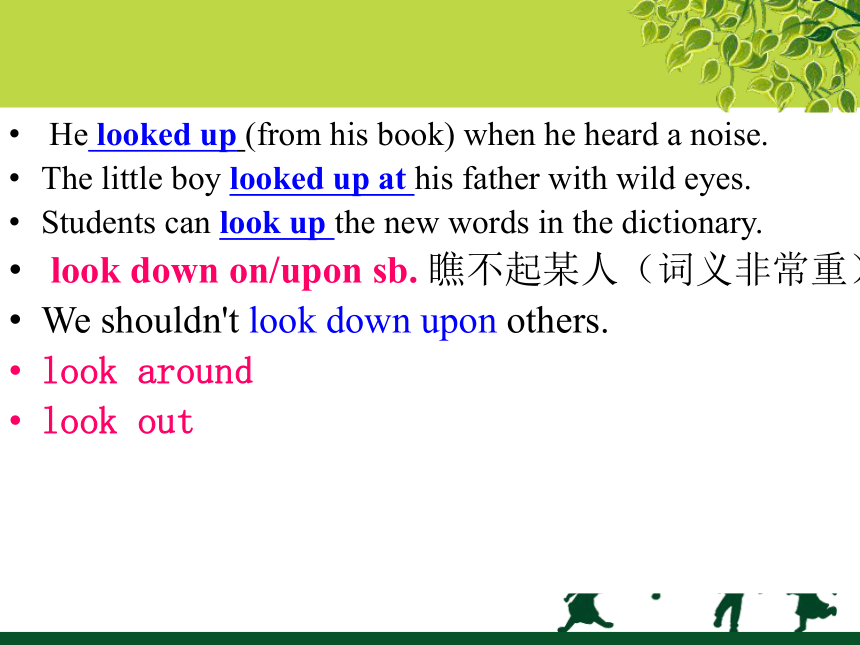
文档简介
(共52张PPT)
Lesson 15
Good news
Key words and expressions
秘书
感到紧张
进入他的办公室
从他的桌子抬头看
进入
负担得起做某事
薪水
用微弱的声音
插话,打断
收到
secretary
feel nervous
go into his office
look up from his desk
enter
afford to do sth
salary
in a weak voice
interrupt
receive
secretary n.秘书 (英)大臣,(美)部长
☆secret n.秘密
tell a secret keep a secret
the secret of success an open secret
☆secret adj.秘密的,保密的,不公开的
a secret marriage a secret document
secret(秘密)+ ary(人)=secretary(秘书)
☆secretary n.秘书,书记
a private secretary
Secretary-general 秘书长
Secretary of State (美)国务卿
☆nervous 精神紧张的
The exam is coming, so I feel very nervous.
adj. 担忧的,紧张的
I felt very nervous when I went into his office.
当我走进他的办公室时,我感到很紧张。
Get nervous 变得紧张
I always get so nervous about going on stage.
我上台就会变得很紧张。
Don't be nervous! 别紧张!
nervous&worried&upset:
nervous:事情正在发生
worried:为以后的事情担心upset:不安的,事情发生以后
nerve [n :v] n. 神经
☆afford [ ‘f d] 担负得起
I have a lot of money, so I could afford an apartment.
v. 买得起,经受得住,承担得起
afford sth: e.g. I can afford the book.
afford money/ time: e.g. I can afford five yuan.
afford to do sth: e.g. I can afford to buy the book.
(注意:一定要加情态动词can)
They took a bus because they couldn t afford to take a taxi.
v.提供,给予
Dancing offords us pleasure.
跳舞给我们带来快乐。
Strong
Weak adj. 弱的
[wi k]
Weak adj.
1. 弱的,虚弱的;衰弱的 She is still weak after her long illness. 久病之后她仍很虚弱。
2. 软弱的,懦弱的;优柔寡断的 He is a man of weak character. 他这个人性格软弱。
3. (能力等)弱的,差的[(+at/in)] He was weak in mathematics, but good at English.
a weak building 一座不牢固的建筑
a weak smile 一个淡淡的微笑
weak sunlight 微弱的阳光
New Word - 5
Interrupt [ nt 'r pt] v.
1.打断(讲话或讲话人)
Interrupt sb 打断某人的话
Don't interrupt me.
It is rude to interrupt.
打断别人的话是不礼貌的。
You interrupted my thoughts.
2.中断;遮断;阻碍 Traffic in the city was interrupted by a snowstorm.
市内交通被暴风雪所阻断。
Extra ['ekstr ]
adj. 额外的
extra time 加时赛
The football match went into extra time.
extra work 额外工作
extra pay for extra work
额外工作的额外报酬
n.号外, 临时演员
He worked as an extra for three years.
Text
The secretary told me that Mr. Harmsworth would see me.
I felt very nervous when I went into his office.
He did not look up from his desk when I entered.
After I had sat down, he said that business was very bad.
He told me that the firm could not afford to pay such large salaries.
Twenty people had already left.
I knew that my turn had come.
'Mr. Harmsworth,' I said in a weak voice.
'Don't interrupt,' he said.
Then he smiled and told me I would receive an extra thousand pounds a year!
text
The secretary told me that Mr. Harmsworth would see me.
Would在这里不单单指过去将来时,更表示想……,要……
例:What would you like to have
He did not look up from his desk when I entered.
look up表示先埋头干什么,之后抬头看。(查字典)
反义词:look down 向下看
He looked up (from his book) when he heard a noise.
The little boy looked up at his father with wild eyes.
Students can look up the new words in the dictionary.
look down on/upon sb. 瞧不起某人(词义非常重)
We shouldn't look down upon others.
look around
look out
He told me that the firm could not afford to pay such large salaries.
pay salary 支付薪水
collect salary 领薪水
1)such+a/an+形容词+可数名词单数=so+形容词+a/an+可数名词单数; 2)so+many/few+可数名词复数,但:such+其他形容词(many/few除外)+可数名词复数; 3)so+much/little+不可数名词,但:such+其他形容词(much/little除外)+不可数名词
so,such区别:
He is so kind (a man)that everyone likes him.
He walked so fast that I couldn't catch up with him.
He is such a kind man that everyone likes him.
They are such kind people that everyone likes them.
I've never eaten such delicious food.
so+adj./adv.+(可数名词单数)
such +a/an+(adj.)+可数名词单数
such +(adj.)+不可数名词
such +(adj.)+可数名词复数
Practice: 用so, such 填空
1.He is _____a good student that we all like him.
2.He is ______good a student that we all like him.
3.It was ______bad weather that he had to stay at home.
4.I've had ______many falls than I'm black and blue all over.
5.The story is ___ amusing that everyone is amused.
such
such
so
so
so
Twenty people had already left.
I knew that my turn had come.
有20个人己经离去,我知道这次该轮到我了。
☆My turn has come.(书面语)It's my turn.(口语)
'Mr. Harmsworth,' I said in a weak voice.
'Don't interrupt,' he said.
"哈姆斯沃斯先生"我无力地说。
"不要打断我的话"他说。
in a ... voice
in a loud/low/weak/strong voice
(low:音量低;weak:心里不塌实,微弱的声音;strong强有力的声音)
Then he smiled and told me I would receive an extra thousand pounds a year!
一千英镑 a thousand pounds
两千英镑 two thousand pounds
额外的一千英镑 an extra thousand pounds
额外的两千英镑 two extra thousand pounds
数词+extra+名词 “额外的...”
Please give me two extra ice-creams.
On Sundays, I usually get some extra sleep.
extra & other& more & another
最灵活的是more,可以放数词和名词之间,甚至可以放在整个名词的后面;
extra和other一定放在数词和名词之间;
another一定放在数词前面。
记住几个短语:one extra thousand;
two others; once more; another three days
Lesson 15 Grammar
直接引语和间接引语
Direct Speech and Indirect Speech
1.He said that business was very bad.
2.He told me that the firm could not
afford to pay such large salaries.
3.He said: “ Don’t interrupt.”
4. He smiled and told me I would receive
an extra thousand pounds a year!
直接引语和间接引语
Direct Speech and Indirect Speech
直接引述别人的话,叫“直接引语”;
用自己的话转述别人的话叫“间接引语”;
直接引语一般前后要加引号;
间接引语不用引号。
如: John said, “I like reading very much.”
John said that he liked reading very much.
把直接引语变为间接引语时,可用动词say, tell,后面可跟人名或者代词,然后以that引导出意思。在动词say后,that可省略。
在转变时,有几点需要注意:
直接引语 (变化前) 间接引语(变化后)
陈述句
Jane said, “I’m very happy to help you.”
简说:“我很高兴能够帮助你。”
that引导的宾语从句
Jane said that she was very happy to help you.
简说,她很高兴能帮助你。
2.1 陈述句
Grammar - 2 直接引语转换间接引语
-不同句式的转换规则
直接引语 (变化前) 间接引语(变化后)
一般疑问句
He asked me, “Do you like playing basketball ”
他问我:“你喜欢打篮球吗?”
whether/if 引导的宾语从句
He asked me if/whether I liked playing basketball.
他问我,我是否喜欢打篮球。
2.2 疑问句
Grammar - 2 直接引语转换间接引语 -不同句式的转换规则
直接引语 (变化前) 间接引语(变化后)
特殊疑问句
My sister asked me , “What do you think of the film ”
他问我:“你感觉这部电影怎么样?”
wh-词引导的宾语从句
My sister asked me what I thought of the film.
他问我,我对这部电影感觉怎么样。
2.3 特殊疑问句
Grammar - 2 直接引语转换间接引语 -不同句式的转变规则
直接引语 (变化前) 间接引语(变化后)
祈使句
He said,“Be seated, please.”
他对我们说:“请坐。”
带 to 的不定式
He asked us to be seated.
他请我们坐下。
2.4 祈使句
Grammar - 2 直接引语转换间接引语 -不同句式的转变规则
转换中的要点1-人称的转换
Grammar - 2 直接引语转换间接引语
1 直接引语中的第一人称,一般转换为第三人称,如:
He said,“I am very sorry.” ——>He said that he was very sorry.
2 直接引语中的第二人称,如果原话是针对转述人说的,转换为第一人称,如:
“You should be more careful next time,” my father told me.——> My father told me that I should be more careful the next time.
转换中的要点1-人称的转换
Grammar - 2 直接引语转换间接引语
3 直接引语中的第二人称,如果原话是针对第三人称说的,转换成第三人称。如:
She said to her son, “I'll check your homework tonight.” ——>
She said to her son that she would check his homework that night.
4 人称的转换包括人称代词、物主代词和名词性物主代词等。如:
He asked me, “Will you go to the station with me to meet a friend of mine this afternoon ” ——>
He asked me whether I would go to the station with him to meet a friend of his that afternoon.
总之,人称的转换不是固定的,具体情况,具体对待,要符合逻辑。
直接引语(变化前) 间接引语(变化后)
一般现在时
“I know it,” he said.
一般过去时
He said that he knew it.
转换中的要点总结2-时态的转换1
Grammar - 2 直接引语转换间接引语
直接引语(变化前) 间接引语(变化后)
现在进行时
“I’m making coffee for you all,” she said.
过去进行时
She said she was making coffee for us all.
2.6 转换中的要点总结2-时态的转换2
Grammar - 2 直接引语转换间接引语
直接引语(变化前) 间接引语(变化后)
一般过去时
“I saw her last Monday,” he said.
过去完成时
He said he had seen her the previous Monday.
2.6 转换中的要点总结2-时态的转换3
Grammar - 2 直接引语转换间接引语
直接引语(变化前) 间接引语(变化后)
过去进行时
“I was waiting for Jim,” she said.
过去完成进行时
She said she had been waiting for Jim.
2.6 转换中的要点总结2-时态的转换4
Grammar - 2 直接引语转换间接引语
直接引语(变化前) 间接引语(变化后)
现在完成时
“I have seen her before,” said he.
过去完成时
He said he had seen her before.
2.6 转换中的要点总结2-时态的转换5
Grammar - 2 直接引语转换间接引语
直接引语(变化前) 间接引语(变化后)
现在完成进行时
He said, “I have been doing it for hours.”
过去完成进行时
He said he had been doing it for hours.
2.6 转换中的要点总结2-时态的转换6
Grammar - 2 直接引语转换间接引语
直接引语(变化前) 间接引语(变化后)
过去完成时
“ Do you know Rick had been ill in bed for many days till he died ” Jack asked.
过去完成时
Jack asked if I knew Rick had been ill in bed for many days till he died.
2.6 转换中的要点总结2-时态的转换7
Grammar - 2 直接引语转换间接引语
直接引语(变化前) 间接引语(变化后)
一般将来时
He said: “We shall start tomorrow.”
过去将来时
He said they would start the next day.
2.6 转换中的要点总结2-时态的转换8
Grammar - 2 直接引语转换间接引语
由直接引语转变为间接引语,下列情况下从句的时态不变:
1. 不变的真理
The teacher said to the students, “Water freezes when the temperature falls below 0℃.”
→ The teacher told the students that water freezes when the temperature falls below 0℃.
2.7 转换中的要点总结3-特例说明1
Grammar - 2 直接引语转换间接引语
由直接引语转变为间接引语,下列情况下从句的时态不变:
2. 当主句的谓语动词是一般现在时时,如:
He always says, “I am tired out.” ——>
He always says that he is tired out.
2.7 转换中的要点总结3-特例说明2
Grammar - 2 直接引语转换间接引语
由直接引语转变为间接引语,下列情况下从句的时态不变:
3. 当主句的谓语动词是将来时的时候,如:
He will say, “I’ll try my best to help you.” —>
He will say that he will try his best to help me.
2.7 转换中的要点总结3-特例说明3
Grammar - 2 直接引语转换间接引语
1. He asked ________ for the computer.
A. did I pay how much B. I paid how much
C. how much did I pay D. how much I paid
2. “Have you seen the film ” he asked me. →He asked me _______.
A. had I seen the film B. have I seen the film
C. if I have seen the film D. whether I had seen the film
3. “Please close the window,” he said to me.
→He ______ me _____ the window.
A. said to; to close B. told to; closing
C. asked ; to close D. said to; please close
4. “I am a teacher,” Jack said. →He said _________.
A. that I am a teacher B. I was a teacher
C. that he is a teacher D. he was a teacher
Exercise - 2 单项选择
5. He said, “Mother, the boy is very naughty.” →He _____- very naughty.
A. said his mother that the boy was
B. said to his mother that the boy is
C. told his mother that the boy was
D. spoke to his mother that the boy was
6. “You’ve already got well, haven’t you ” she asked.
→She asked ________.
A. if I have already got well, hadn’t you
B. whether I had already got well
C. have I already got well
D. had I already got well.
Exercise - 2 单项选择
7. He asked, “Are you a Party member or a League member ”
→He asked me _________.
A. am I a Party member or a League member
B. was I a Party member or a League member
C. if I was a Party member or a League member
D. whether was I a Party member or a League member.
8. He asked, “How are you getting along ” →He asked _______.
A. how am I getting along B. how are you getting along
C. how I was getting along D. how was I getting along
Exercise - 2 单项选择
Exercise-3 填空
1. “I never eat meat.” he said.
He said that ______ never ______ meat.
2. “I’ve found my wallet.” he said to me.
He ______ me that he ______ ______ ______ wallet.
3. “I took it home with me.” she said.
She said that ______ ______ _______ it home with her.
4. The teacher said, “The sun rises in the east and goes down in the west.”
The teacher said that the sun ______ in the east and ______ down in the west.
Exercise-3 填空
5. “I met her yesterday.” he said to me.
He ______ me that he ______ met the day ______.
6. “You must come here before five.” he said.
He said that I ______ to go ______ before five.
7. “I bought the house 10 years ago.” he said.
He said that he _______ bought the house 10 years _______.
8. “Did you see her last week ” he said.
He ______ ______ I had seen her the week _______
9. He said, “You can sit here, Jim.”
He ______ Jim that he ______ sit there
1.Lucy says, “Kate has a cat.”
2.Tom said, “My mother is cooking.”
3.Mike says, “Our teacher likes fish.”
4.Lily said, “We will go to school by car.”
5.Sam says, “ I want to see Mr Green.”
Lucy says that Kate has a cat.
Tom said that his mother was cooking.
Mike says that their teacher likes fish.
Lily said that they would go to school by car.
Sam says that he wants to see Mr Green.
1、我知道你是对的。
2、Mary告诉我她已经完成了家庭作业。
3、我听说(hear)她明天将会去香港。
4、我想Jim现在正在听音乐。
5、Lisa说Ken昨天没有去学校。
试 一 试
I know/knew that you are/were right.
Mary told me that she had already done her homework.
I heard that she would go to Hong Kong tomorrow.
I think Jim is listening to the music now.
Lisa says that Ken didn’t go to school yesterday.
一.句型之间的转换
1.He said: “I’ve left my book in my room.”
2.She said: “He will be busy.”
3.She said to Tom, “Can you help me ”
4.She asked, “Is this book yours or his ”
5.The teacher asked, “how did you repair it ”
Exercise - 1 句型转换练习
一.句型之间的转换
6.The teacher said to the students, “Don’t waste your time.”
7.The mother said, “Tom, get up early, please.”
8.The teacher said, “The earth goes round the sun.”
9.My father said, “Practice makes perfect.”
10.The boy said to us, “ I usually get up at six every day.”
Exercise - 1 句型转换练习
答案:
1. He told me that he had left his book in his room.
2. She said that he would be busy.
3. She asked Tom if /whether he could help her.
4. She asked me whether that book was mine or his.
5. The teacher asked me how I had repaired it.
6. The teacher told the students not to waste their time.
7. The mother asked Tom to get up early.
8. The teacher said that the earth goes round the sun.
9. My father said practice makes perfect.
10. The boy told us he usually gets up at six every day.
The ________ told me that Mr. Harmsworth _____ see me. I felt very _______when I _____ into his office. He did not look up _____ his desk when I ______. After I had sat down, he said that ________ was very bad. He told me that the firm _____ not afford to pay _____ large salaries. ______ people had already left. I knew that _____ turn had come.
I said _____ a weak voice: “ Mr. Harmsworth.” But he told me not to _________ him. Then he _____ and told me I would ______ an extra thousand pounds _____ year!
secretary
would
nervous
went
from
entered
business
could
such
Twenty
my
in
interrupt
smiled
receive
a
Lesson 15
Good news
Key words and expressions
秘书
感到紧张
进入他的办公室
从他的桌子抬头看
进入
负担得起做某事
薪水
用微弱的声音
插话,打断
收到
secretary
feel nervous
go into his office
look up from his desk
enter
afford to do sth
salary
in a weak voice
interrupt
receive
secretary n.秘书 (英)大臣,(美)部长
☆secret n.秘密
tell a secret keep a secret
the secret of success an open secret
☆secret adj.秘密的,保密的,不公开的
a secret marriage a secret document
secret(秘密)+ ary(人)=secretary(秘书)
☆secretary n.秘书,书记
a private secretary
Secretary-general 秘书长
Secretary of State (美)国务卿
☆nervous 精神紧张的
The exam is coming, so I feel very nervous.
adj. 担忧的,紧张的
I felt very nervous when I went into his office.
当我走进他的办公室时,我感到很紧张。
Get nervous 变得紧张
I always get so nervous about going on stage.
我上台就会变得很紧张。
Don't be nervous! 别紧张!
nervous&worried&upset:
nervous:事情正在发生
worried:为以后的事情担心upset:不安的,事情发生以后
nerve [n :v] n. 神经
☆afford [ ‘f d] 担负得起
I have a lot of money, so I could afford an apartment.
v. 买得起,经受得住,承担得起
afford sth: e.g. I can afford the book.
afford money/ time: e.g. I can afford five yuan.
afford to do sth: e.g. I can afford to buy the book.
(注意:一定要加情态动词can)
They took a bus because they couldn t afford to take a taxi.
v.提供,给予
Dancing offords us pleasure.
跳舞给我们带来快乐。
Strong
Weak adj. 弱的
[wi k]
Weak adj.
1. 弱的,虚弱的;衰弱的 She is still weak after her long illness. 久病之后她仍很虚弱。
2. 软弱的,懦弱的;优柔寡断的 He is a man of weak character. 他这个人性格软弱。
3. (能力等)弱的,差的[(+at/in)] He was weak in mathematics, but good at English.
a weak building 一座不牢固的建筑
a weak smile 一个淡淡的微笑
weak sunlight 微弱的阳光
New Word - 5
Interrupt [ nt 'r pt] v.
1.打断(讲话或讲话人)
Interrupt sb 打断某人的话
Don't interrupt me.
It is rude to interrupt.
打断别人的话是不礼貌的。
You interrupted my thoughts.
2.中断;遮断;阻碍 Traffic in the city was interrupted by a snowstorm.
市内交通被暴风雪所阻断。
Extra ['ekstr ]
adj. 额外的
extra time 加时赛
The football match went into extra time.
extra work 额外工作
extra pay for extra work
额外工作的额外报酬
n.号外, 临时演员
He worked as an extra for three years.
Text
The secretary told me that Mr. Harmsworth would see me.
I felt very nervous when I went into his office.
He did not look up from his desk when I entered.
After I had sat down, he said that business was very bad.
He told me that the firm could not afford to pay such large salaries.
Twenty people had already left.
I knew that my turn had come.
'Mr. Harmsworth,' I said in a weak voice.
'Don't interrupt,' he said.
Then he smiled and told me I would receive an extra thousand pounds a year!
text
The secretary told me that Mr. Harmsworth would see me.
Would在这里不单单指过去将来时,更表示想……,要……
例:What would you like to have
He did not look up from his desk when I entered.
look up表示先埋头干什么,之后抬头看。(查字典)
反义词:look down 向下看
He looked up (from his book) when he heard a noise.
The little boy looked up at his father with wild eyes.
Students can look up the new words in the dictionary.
look down on/upon sb. 瞧不起某人(词义非常重)
We shouldn't look down upon others.
look around
look out
He told me that the firm could not afford to pay such large salaries.
pay salary 支付薪水
collect salary 领薪水
1)such+a/an+形容词+可数名词单数=so+形容词+a/an+可数名词单数; 2)so+many/few+可数名词复数,但:such+其他形容词(many/few除外)+可数名词复数; 3)so+much/little+不可数名词,但:such+其他形容词(much/little除外)+不可数名词
so,such区别:
He is so kind (a man)that everyone likes him.
He walked so fast that I couldn't catch up with him.
He is such a kind man that everyone likes him.
They are such kind people that everyone likes them.
I've never eaten such delicious food.
so+adj./adv.+(可数名词单数)
such +a/an+(adj.)+可数名词单数
such +(adj.)+不可数名词
such +(adj.)+可数名词复数
Practice: 用so, such 填空
1.He is _____a good student that we all like him.
2.He is ______good a student that we all like him.
3.It was ______bad weather that he had to stay at home.
4.I've had ______many falls than I'm black and blue all over.
5.The story is ___ amusing that everyone is amused.
such
such
so
so
so
Twenty people had already left.
I knew that my turn had come.
有20个人己经离去,我知道这次该轮到我了。
☆My turn has come.(书面语)It's my turn.(口语)
'Mr. Harmsworth,' I said in a weak voice.
'Don't interrupt,' he said.
"哈姆斯沃斯先生"我无力地说。
"不要打断我的话"他说。
in a ... voice
in a loud/low/weak/strong voice
(low:音量低;weak:心里不塌实,微弱的声音;strong强有力的声音)
Then he smiled and told me I would receive an extra thousand pounds a year!
一千英镑 a thousand pounds
两千英镑 two thousand pounds
额外的一千英镑 an extra thousand pounds
额外的两千英镑 two extra thousand pounds
数词+extra+名词 “额外的...”
Please give me two extra ice-creams.
On Sundays, I usually get some extra sleep.
extra & other& more & another
最灵活的是more,可以放数词和名词之间,甚至可以放在整个名词的后面;
extra和other一定放在数词和名词之间;
another一定放在数词前面。
记住几个短语:one extra thousand;
two others; once more; another three days
Lesson 15 Grammar
直接引语和间接引语
Direct Speech and Indirect Speech
1.He said that business was very bad.
2.He told me that the firm could not
afford to pay such large salaries.
3.He said: “ Don’t interrupt.”
4. He smiled and told me I would receive
an extra thousand pounds a year!
直接引语和间接引语
Direct Speech and Indirect Speech
直接引述别人的话,叫“直接引语”;
用自己的话转述别人的话叫“间接引语”;
直接引语一般前后要加引号;
间接引语不用引号。
如: John said, “I like reading very much.”
John said that he liked reading very much.
把直接引语变为间接引语时,可用动词say, tell,后面可跟人名或者代词,然后以that引导出意思。在动词say后,that可省略。
在转变时,有几点需要注意:
直接引语 (变化前) 间接引语(变化后)
陈述句
Jane said, “I’m very happy to help you.”
简说:“我很高兴能够帮助你。”
that引导的宾语从句
Jane said that she was very happy to help you.
简说,她很高兴能帮助你。
2.1 陈述句
Grammar - 2 直接引语转换间接引语
-不同句式的转换规则
直接引语 (变化前) 间接引语(变化后)
一般疑问句
He asked me, “Do you like playing basketball ”
他问我:“你喜欢打篮球吗?”
whether/if 引导的宾语从句
He asked me if/whether I liked playing basketball.
他问我,我是否喜欢打篮球。
2.2 疑问句
Grammar - 2 直接引语转换间接引语 -不同句式的转换规则
直接引语 (变化前) 间接引语(变化后)
特殊疑问句
My sister asked me , “What do you think of the film ”
他问我:“你感觉这部电影怎么样?”
wh-词引导的宾语从句
My sister asked me what I thought of the film.
他问我,我对这部电影感觉怎么样。
2.3 特殊疑问句
Grammar - 2 直接引语转换间接引语 -不同句式的转变规则
直接引语 (变化前) 间接引语(变化后)
祈使句
He said,“Be seated, please.”
他对我们说:“请坐。”
带 to 的不定式
He asked us to be seated.
他请我们坐下。
2.4 祈使句
Grammar - 2 直接引语转换间接引语 -不同句式的转变规则
转换中的要点1-人称的转换
Grammar - 2 直接引语转换间接引语
1 直接引语中的第一人称,一般转换为第三人称,如:
He said,“I am very sorry.” ——>He said that he was very sorry.
2 直接引语中的第二人称,如果原话是针对转述人说的,转换为第一人称,如:
“You should be more careful next time,” my father told me.——> My father told me that I should be more careful the next time.
转换中的要点1-人称的转换
Grammar - 2 直接引语转换间接引语
3 直接引语中的第二人称,如果原话是针对第三人称说的,转换成第三人称。如:
She said to her son, “I'll check your homework tonight.” ——>
She said to her son that she would check his homework that night.
4 人称的转换包括人称代词、物主代词和名词性物主代词等。如:
He asked me, “Will you go to the station with me to meet a friend of mine this afternoon ” ——>
He asked me whether I would go to the station with him to meet a friend of his that afternoon.
总之,人称的转换不是固定的,具体情况,具体对待,要符合逻辑。
直接引语(变化前) 间接引语(变化后)
一般现在时
“I know it,” he said.
一般过去时
He said that he knew it.
转换中的要点总结2-时态的转换1
Grammar - 2 直接引语转换间接引语
直接引语(变化前) 间接引语(变化后)
现在进行时
“I’m making coffee for you all,” she said.
过去进行时
She said she was making coffee for us all.
2.6 转换中的要点总结2-时态的转换2
Grammar - 2 直接引语转换间接引语
直接引语(变化前) 间接引语(变化后)
一般过去时
“I saw her last Monday,” he said.
过去完成时
He said he had seen her the previous Monday.
2.6 转换中的要点总结2-时态的转换3
Grammar - 2 直接引语转换间接引语
直接引语(变化前) 间接引语(变化后)
过去进行时
“I was waiting for Jim,” she said.
过去完成进行时
She said she had been waiting for Jim.
2.6 转换中的要点总结2-时态的转换4
Grammar - 2 直接引语转换间接引语
直接引语(变化前) 间接引语(变化后)
现在完成时
“I have seen her before,” said he.
过去完成时
He said he had seen her before.
2.6 转换中的要点总结2-时态的转换5
Grammar - 2 直接引语转换间接引语
直接引语(变化前) 间接引语(变化后)
现在完成进行时
He said, “I have been doing it for hours.”
过去完成进行时
He said he had been doing it for hours.
2.6 转换中的要点总结2-时态的转换6
Grammar - 2 直接引语转换间接引语
直接引语(变化前) 间接引语(变化后)
过去完成时
“ Do you know Rick had been ill in bed for many days till he died ” Jack asked.
过去完成时
Jack asked if I knew Rick had been ill in bed for many days till he died.
2.6 转换中的要点总结2-时态的转换7
Grammar - 2 直接引语转换间接引语
直接引语(变化前) 间接引语(变化后)
一般将来时
He said: “We shall start tomorrow.”
过去将来时
He said they would start the next day.
2.6 转换中的要点总结2-时态的转换8
Grammar - 2 直接引语转换间接引语
由直接引语转变为间接引语,下列情况下从句的时态不变:
1. 不变的真理
The teacher said to the students, “Water freezes when the temperature falls below 0℃.”
→ The teacher told the students that water freezes when the temperature falls below 0℃.
2.7 转换中的要点总结3-特例说明1
Grammar - 2 直接引语转换间接引语
由直接引语转变为间接引语,下列情况下从句的时态不变:
2. 当主句的谓语动词是一般现在时时,如:
He always says, “I am tired out.” ——>
He always says that he is tired out.
2.7 转换中的要点总结3-特例说明2
Grammar - 2 直接引语转换间接引语
由直接引语转变为间接引语,下列情况下从句的时态不变:
3. 当主句的谓语动词是将来时的时候,如:
He will say, “I’ll try my best to help you.” —>
He will say that he will try his best to help me.
2.7 转换中的要点总结3-特例说明3
Grammar - 2 直接引语转换间接引语
1. He asked ________ for the computer.
A. did I pay how much B. I paid how much
C. how much did I pay D. how much I paid
2. “Have you seen the film ” he asked me. →He asked me _______.
A. had I seen the film B. have I seen the film
C. if I have seen the film D. whether I had seen the film
3. “Please close the window,” he said to me.
→He ______ me _____ the window.
A. said to; to close B. told to; closing
C. asked ; to close D. said to; please close
4. “I am a teacher,” Jack said. →He said _________.
A. that I am a teacher B. I was a teacher
C. that he is a teacher D. he was a teacher
Exercise - 2 单项选择
5. He said, “Mother, the boy is very naughty.” →He _____- very naughty.
A. said his mother that the boy was
B. said to his mother that the boy is
C. told his mother that the boy was
D. spoke to his mother that the boy was
6. “You’ve already got well, haven’t you ” she asked.
→She asked ________.
A. if I have already got well, hadn’t you
B. whether I had already got well
C. have I already got well
D. had I already got well.
Exercise - 2 单项选择
7. He asked, “Are you a Party member or a League member ”
→He asked me _________.
A. am I a Party member or a League member
B. was I a Party member or a League member
C. if I was a Party member or a League member
D. whether was I a Party member or a League member.
8. He asked, “How are you getting along ” →He asked _______.
A. how am I getting along B. how are you getting along
C. how I was getting along D. how was I getting along
Exercise - 2 单项选择
Exercise-3 填空
1. “I never eat meat.” he said.
He said that ______ never ______ meat.
2. “I’ve found my wallet.” he said to me.
He ______ me that he ______ ______ ______ wallet.
3. “I took it home with me.” she said.
She said that ______ ______ _______ it home with her.
4. The teacher said, “The sun rises in the east and goes down in the west.”
The teacher said that the sun ______ in the east and ______ down in the west.
Exercise-3 填空
5. “I met her yesterday.” he said to me.
He ______ me that he ______ met the day ______.
6. “You must come here before five.” he said.
He said that I ______ to go ______ before five.
7. “I bought the house 10 years ago.” he said.
He said that he _______ bought the house 10 years _______.
8. “Did you see her last week ” he said.
He ______ ______ I had seen her the week _______
9. He said, “You can sit here, Jim.”
He ______ Jim that he ______ sit there
1.Lucy says, “Kate has a cat.”
2.Tom said, “My mother is cooking.”
3.Mike says, “Our teacher likes fish.”
4.Lily said, “We will go to school by car.”
5.Sam says, “ I want to see Mr Green.”
Lucy says that Kate has a cat.
Tom said that his mother was cooking.
Mike says that their teacher likes fish.
Lily said that they would go to school by car.
Sam says that he wants to see Mr Green.
1、我知道你是对的。
2、Mary告诉我她已经完成了家庭作业。
3、我听说(hear)她明天将会去香港。
4、我想Jim现在正在听音乐。
5、Lisa说Ken昨天没有去学校。
试 一 试
I know/knew that you are/were right.
Mary told me that she had already done her homework.
I heard that she would go to Hong Kong tomorrow.
I think Jim is listening to the music now.
Lisa says that Ken didn’t go to school yesterday.
一.句型之间的转换
1.He said: “I’ve left my book in my room.”
2.She said: “He will be busy.”
3.She said to Tom, “Can you help me ”
4.She asked, “Is this book yours or his ”
5.The teacher asked, “how did you repair it ”
Exercise - 1 句型转换练习
一.句型之间的转换
6.The teacher said to the students, “Don’t waste your time.”
7.The mother said, “Tom, get up early, please.”
8.The teacher said, “The earth goes round the sun.”
9.My father said, “Practice makes perfect.”
10.The boy said to us, “ I usually get up at six every day.”
Exercise - 1 句型转换练习
答案:
1. He told me that he had left his book in his room.
2. She said that he would be busy.
3. She asked Tom if /whether he could help her.
4. She asked me whether that book was mine or his.
5. The teacher asked me how I had repaired it.
6. The teacher told the students not to waste their time.
7. The mother asked Tom to get up early.
8. The teacher said that the earth goes round the sun.
9. My father said practice makes perfect.
10. The boy told us he usually gets up at six every day.
The ________ told me that Mr. Harmsworth _____ see me. I felt very _______when I _____ into his office. He did not look up _____ his desk when I ______. After I had sat down, he said that ________ was very bad. He told me that the firm _____ not afford to pay _____ large salaries. ______ people had already left. I knew that _____ turn had come.
I said _____ a weak voice: “ Mr. Harmsworth.” But he told me not to _________ him. Then he _____ and told me I would ______ an extra thousand pounds _____ year!
secretary
would
nervous
went
from
entered
business
could
such
Twenty
my
in
interrupt
smiled
receive
a
同课章节目录
